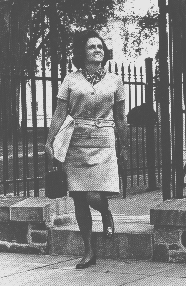Page 1
[Begin Tape 1, Side A]
Ritchie: You're probably familiar, Isabelle, with how we do these interviews. We start with your very early years. So today I thought we would begin before your career even got started in journalism.
Shelton: Yes.
Ritchie: I thought you might tell me a little bit about your mother and father.
Shelton: Okay. My father [Jarlath John Graham] graduated from Yale Scientific School—Sheffield Scientific School—but he never worked in that field. He was a stockbroker and a financial advisor of estate planning, that kind of stuff. My mother [Isabel Corboy Graham] came from—they were both of Irish extraction but two generations behind them. Her name was Corboy. It's a big plumbing contracting firm in Chicago. Later—when I knew about it, for instance, they had the contract to do all the plumbing in the Atlanta subway system. I mean, it's sort of a major firm.
They were married in 1912. My father had a bit of a drinking problem. It's the curse of the Irish, I'm afraid. They had four children of which I'm the oldest. I had three younger brothers.
Ritchie: So you were the only girl.
Shelton: I was the only girl, yes. We lived either in Chicago or in the suburbs. We lived in Lake Forest for several years and we had just moved to Glencoe, which is a little closer to Chicago, when my mother became seriously ill. She had a nervous breakdown. I had just turned thirteen. My life up until that time had been sort of pleasant and uneventful. But my whole life turned around with that event which totally coincidentally was—except it helps me fix the date in my mind—was almost exactly the time of the big stock market crash in 1929. As I said, the two were unrelated but it was a monumental event in my life. It changed everything.
We lived in a house in Glencoe and there was no way that my father could leave these four children in the house and go to work in the morning. My youngest brother was only about a year, year and a half, something like that. So an aunt [Elizabeth Padden], actually the sister of my grandmother, my father's mother [Minnie Padden Graham]—who owned an apartment building in Chicago, just a six-flat building—took us in, originally into her apartment which made it very crowded, decidedly, with five more people suddenly coming in. And eventually one of her apartments became vacant and we took that.
But especially after that happened, I became chief cook and bottle washer, and I was just thirteen. I really didn't know what I was doing. For a while, we would get dinner—this says something about the prices then—there was a little sort of a deli around the corner from the apartment and we could buy a complete dinner on a paper plate—meat, potato, vegetable and either a little salad or applesauce, something like that—for twenty-five cents. Of course, we didn't need a whole one for little kids. So we would buy a few of those and that would be our dinner.
But the Depression began to affect us rather soon and sometimes we only had peanut butter sandwiches for dinner. But mostly it changed my life because all of a sudden I was trying to raise three children, which was ludicrous because I was little more than a child myself.
Anyway, I graduated from—I was going mostly to Catholic schools.

